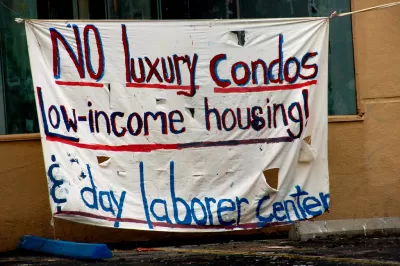It makes economic sense: increase supply in desirable areas to match demand. These articles look at some of the factors complicating that story in on the west coast.

"Since the 1970s, coastal California, from the Bay Area to Los Angeles, has seen dramatically slower housing growth than the United States as a whole – even as the region's population has boomed." This is due for the most part to long restrictions on new construction. In a piece for City Observatory, Daniel Hertz acknowledges that yes, more housing does curtail rising rents.
But Hertz makes the psychological point that "People don't live their lives from 30,000 feet; they live them on the ground, which is why these ideas often seem so counterintuitive. [...] Arguments about supply and demand, though important, aren't necessarily addressing their immediate needs and fears."
A long-term regional balancing act shouldn't excuse kicking people out of their homes. Instead, Hertz writes, "we need to acknowledge the need for both housing growth policies and anti-displacement policies."
-------------------------------------------------
In a separate article published by Slate, Henry Grabar ties the Bay Area's astronomical rents to established suburbs, saying those neighborhoods haven't shouldered their fair share of the region's housing burden. Job sprawl ensues: "Of the 1.75 million jobs within 35 miles of downtown San Francisco, only 45 percent are within 10 miles. That's 12 percentage points lower than average for a big U.S. city."
Again, old laws have rendered new development difficult, creating an imbalance. In 2013, "The Association of Bay Area Governments and the Metropolitan Transportation Commission introduced Plan Bay Area—a proposal to funnel the majority of housing and business growth into just a few key areas."
Grabar laments the predicable reaction from some of the plan's opponents, who have been known to cite the infamous Agenda 21 conspiracy theory.
FULL STORY: Portland, the Mission, and the housing affordability debate

Planetizen Federal Action Tracker
A weekly monitor of how Trump’s orders and actions are impacting planners and planning in America.

Restaurant Patios Were a Pandemic Win — Why Were They so Hard to Keep?
Social distancing requirements and changes in travel patterns prompted cities to pilot new uses for street and sidewalk space. Then it got complicated.

Maui's Vacation Rental Debate Turns Ugly
Verbal attacks, misinformation campaigns and fistfights plague a high-stakes debate to convert thousands of vacation rentals into long-term housing.

In California Battle of Housing vs. Environment, Housing Just Won
A new state law significantly limits the power of CEQA, an environmental review law that served as a powerful tool for blocking new development.

Boulder Eliminates Parking Minimums Citywide
Officials estimate the cost of building a single underground parking space at up to $100,000.

Orange County, Florida Adopts Largest US “Sprawl Repair” Code
The ‘Orange Code’ seeks to rectify decades of sprawl-inducing, car-oriented development.
Urban Design for Planners 1: Software Tools
This six-course series explores essential urban design concepts using open source software and equips planners with the tools they need to participate fully in the urban design process.
Planning for Universal Design
Learn the tools for implementing Universal Design in planning regulations.
Heyer Gruel & Associates PA
JM Goldson LLC
Custer County Colorado
City of Camden Redevelopment Agency
City of Astoria
Transportation Research & Education Center (TREC) at Portland State University
Camden Redevelopment Agency
City of Claremont
Municipality of Princeton (NJ)





























